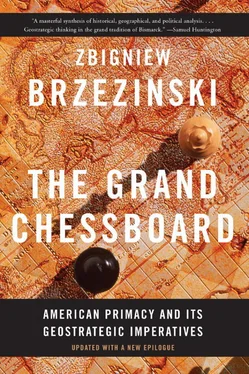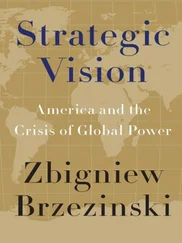China’s economic expansion not only impacts Central Asia. With its extensive economic interests throughout the Middle East—for its oil, export markets, and infrastructure projects—China has a vested interest in the region’s stability. Given the economic importance of the region and the proximity of its religious extremism to China’s own restive minority, China cannot afford to remain on the sidelines as the Middle East is torn apart by sectarian violence.
China is currently the world’s emerging power. It has risen steadily, both economically and geopolitically, as it strives to match and perhaps surpass America. However, it is careful to avoid an overt geopolitical confrontation with the United States. The challenge for Washington is how to responsibly draw Beijing into a greater role in maintaining world order, not just in the Pacific, but also in the Middle East and Central Asia.
Faced with an evolving global structure, America must work to draw Russia into a larger West and simultaneously pursue a long-term geopolitical vision that includes cooperation between the United States, China, and Russia.
A national Russia, without its former non-Russian subjects, faces the reality that its future lies in the West. Its waning influence in Central Asia notwithstanding, Russia’s size and geographical location enables it to potentially emerge as a prominent European state, despite its weaker economic clout and current lack of respect for human rights and law. Russia’s movement westward can be hastened and facilitated by China’s outreach to Europe and an arrangement between China and Russia of de facto shared influence in Central Asia.
This lengthy process rests largely on how Russia—too important to be ignored—is able to relate itself to the West; chiefly with Europe and with the principal international sponsor of the European Union—the United States—and how it copes with the delegitimation of its corrupt leadership. The two options are stark: either Russia fails dramatically and further destabilizes world order, or it successfully transitions into a stable country and responsible international actor. The latter, clearly preferable, depends largely on Russia’s ability to discontinue its destabilizing supra-nationalistic endeavors.
In the short term, China should be encouraged to pursue a geostrategic outlook that favors stability over conflict as it embarks on its One Belt, One Road program. To increase the stability that it seeks, China can no longer afford to remain publically neutral on significant global issues. And that requires a geopolitically global American-Chinese accommodation.
An increasingly complex Middle East, where the spread of conflict has been precipitated more by the rise of religious sectarianism and long-repressed memories of colonial brutality than by American involvement, impacts all global actors. Competition over the geopolitical and economic influence of regional countries such as Egypt, Iran, Israel, Saudi Arabia, and Turkey will serve as the future arena for China, Russia, and the United States.
Short-term solutions or politically expedient talking points will not solve today’s problems. Instead, a framework of cooperation and pressure is needed in order to promote long-term collaboration between all three sides: China, the problem of the future; Russia, the disrupter of the present; and the United States, the aging superpower caught in the vice of history.
As I concluded in the original edition of The Grand Chessboard , “In the long run, global politics are bound to become increasingly uncongenial to the concentration of hegemonic power in the hands of a single state. Hence, America is not only the first, as well as the only, truly global superpower, but it is also likely to be the very last.” [2]
These words were a warning, but not a forecast. America’s relative decline and the events that followed were not inevitable. Today, the world still needs not an America content to engage in unilateral wars but a global superpower that recognizes the fleeting nature of its unique preeminence and thus seeks to develop a more multipolar world order. While the landscape has changed, the United States still has a strategic mission.
Zbigniew Brzezinski June 14, 2016
Abkhazians, 129, 142
Afghanistan, 125, 128, 138, 140, 145, 187; ethnic groups in, 129, 131–33; Pakistan and, 139, 149; in Persian empire, 137; Soviet invasion of, 7, 91, 141
Algeria, 63, 78
Alliance 90/Greens, 73
Ambartsumov, Y., 107
Arab-Israeli conflict, 53
Armenia, 9, 122, 125, 140, 143, 144, 150; Russian military deployment in, 107; Turkey and, 93; war with Azerbaijan, 128–29, 142, 144
Asia-Pacific Economic Cooperation Group (APEC), 27, 28, 153
Asian Regional Forum (ARF), 153
Association of Southeast Asian Nations (ASEAN), 153, 168 n
Astrakhan khanate, 140
Australia, 45, 157, 169, 188
Austria, 70, 77
Austro-Hungarian Empire, 135
Azerbaijan, 9, 41, 52, 122, 125, 138, 149, 203; and Commonwealth of Independent States, 114, 143, 147; energy resources of, 46–47, 121, 139, 140, 145; Iran and, 134, 135; in Ottoman Empire, 136; political elites of, 133; Turkey and, 93, 204; war with Armenia, 128–29, 142, 144
Baghdad, Caliphate of, 15
Bangladesh, 164
Belarus, 59, 92, 114; in Commonwealth of Independent States, 88, 106; in Community of Sovereign Republics, 109; Germany and, 69, 70
Berlin blockade, 6, 25, 62
Blair, Tony, 26
Bolingbroke, Lord, 70–71
Bosnia, crisis in, 59, 71; war crimes during, 29
Bretton Woods Conference, 27
Britain, 50, 96, 153, 207; Balkans and, 135; China and, 14–15, 158, 159; global maritime domination by, 19, 21; and united Europe, 42–43, 45, 66
Browning, Robert, 40
Brunei, 183
Bulgaria, 82
Burma, 13, 164, 165
Byzantium, 81
Canada, 185
Carthage, 12
Center for Strategic and International Studies (CSIS), 200 n , 204 n
Central Asian Economic Union, 145
Charette, Hervé de, 66–67
Charlemagne Europe, 81
Chechnya, 89, 91, 92, 95, 97, 99, 114, 133, 140, 141; pipeline through, 37; Turkey and, 93, 136
China, 19, 41, 49, 54, 55, 101, 151–57, 185–93, 195, 197, 199, 202, 205–10, 219–221; and Eurasian Balkans, 124, 132, 135, 138–39, 143, 148, 149; geostrategy of, 44–46; imperial, 12–16, 21; Japan and, 15, 54, 55, 158–60, 164, 166, 169, 170, 172–85; as regional versus global power, 158–73; Russia and, 23, 95, 115–19, 151, 155, 158, 159, 164, 166–68, 170, 219–221; Soviet Union and, 8–9, 87–88; Taiwan and, 44, 48, 154, 156, 159, 164–65, 167–69, 171, 181, 188–89, 197, 205–7, 214
Ch’ing dynasty, 13
Christian Democrats, German, 74
Christians, 59, 81, 128
Clinton, Bill, 26, 195
Cold War, 6–7, 23, 36, 68, 117, 177, 200, 213, 214; Charlemagne Europe during, 81; France during, 61–63; international institutions established during, 29; Japan during, 178; NATO and, 101, 172; public support for, 25, 211
Combined Joint Task Forces, 77
Comecon, 100
Commonwealth of Independent States (CIS), 100; establishment of, 88, 92–93; Eurasian Balkans in, 129, 139, 142–45, 147, 149; and “near abroad” policy, 105–9, 111, 113
Communists, 88; Chinese, 9, 88, 158, 161–63, 173 n ; Soviet, 89, 90, 100–101, 115, 120
Community of Sovereign Republics, 109
Community of Integrated States, 109
Confucianism, 13, 17
Congress, U. S., 28
Cordesman, Anthony, H., 204 n
Council for Foreign and Defense Policy, 106
Council of Europe, 119
Crimea, 93, 107, 112, 140
Cuban missile crisis, 62
Cultural Revolution, 162
Читать дальше












